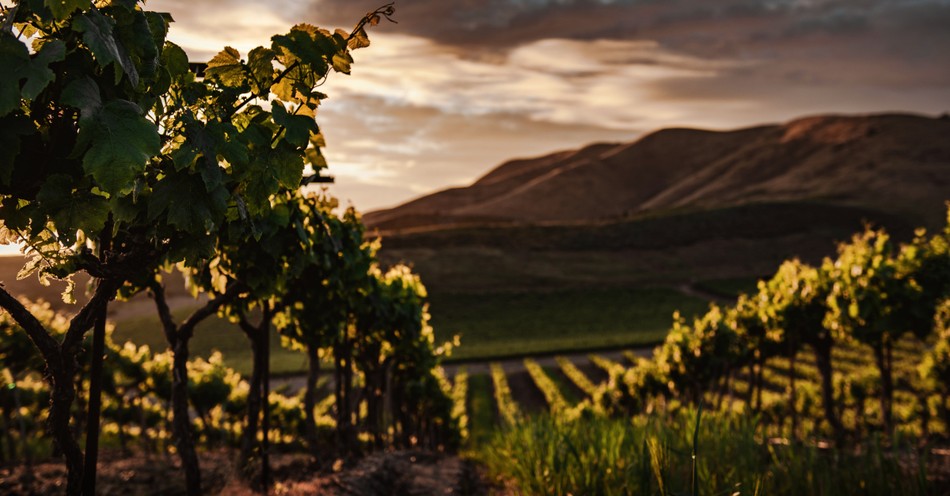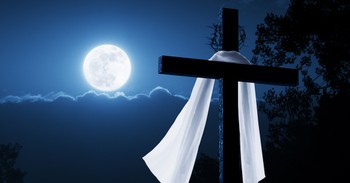Many of us know the story—in the hours after the start of Passover, when Jesus and His disciples had shared their evening meal and Judas had gone off in betrayal, Jesus is comforting the disciples with many teachings about the mysterious things that are to come.
Jesus tells them He is going to prepare a place for them and that soon they will receive the Holy Spirit as their advocate. Then, to drive home His ultimate point—that He is indeed the way, the truth, and the life (from John 14:6)—Jesus uses a metaphor that would have been crystal-clear to any Israelite of that day.
"'I am the true vine, and my Father is the gardener,'" Jesus tells the disciples in John 15:1. Then, as if His meaning isn't already understood, Jesus elaborates further, noting that the disciples are His branches and that as long as they remain in Him, nourished and sustained, they will bear fruit and thrive. But, Jesus warns, "'Apart from me you can do nothing. If you do not remain in me, you are like a branch that is thrown away and withers; such branches are picked up, thrown into the fire and burned. If you remain in me and my words remain in you, ask whatever you wish, and it will be done for you'" (John 15:5b-7).
However, we are not first-century farmers or other workers of the land and sea accustomed to metaphors like this. Indeed, many of us have only ever seen vines in pictures or on television. We understand the concept of what it means but not the actuality. And most of us are also not raised in the context and with the ancient stories of Judaism, as the disciples would have been.
What does it mean that Jesus is the true vine? And how does this truth apply to us today?
What Does it Mean That Jesus Is the True Vine in John 15?
A vine, as defined by Merriam-Webster Dictionary, is a plant whose stem requires support and which climbs by tendrils or twining or creeps along the ground. A grapevine, for example, has a main vine that sends nutrients from the root of the plant to the branches, which then thrive and bear fruit. Vines were used throughout the Old Testament as a symbol of Israel, an old and holy image.
As the psalmist writes, "You transplanted a vine from Egypt; you drove out the nations and planted it. You cleared the ground for it, and it took root and filled the land" (Psalm 80:8-9).
But along the way, the vine grew wild, off-path; it stopped bearing good fruit, withered, and was consumed by fire (Jeremiah 2:21, Ezekiel 19:10-14, Isaiah 5:1-7). Most times, the vine was used as an illustration of how Israel had strayed from the Lord. But when Jesus said He was the "true vine" and that the disciples were to remain in Him, this was an illustration of how the disciples and anyone else who followed Him could get back on track. By nourishing themselves only through Jesus, they were getting their strength from the true source of life, God Himself, Word-become flesh and born a man (John 1). They could bear fruit and live and thrive—indeed, have eternal life and be saved—through their connection with Jesus. As Jesus says in John 15:4, "'Remain in me, as I also remain in you. No branch can bear fruit by itself; it must remain in the vine. Neither can you bear fruit unless you remain in me.'"
They are connected, Jesus is saying, a true circle of life-sustaining support.
Why Does Jesus Use the Metaphor of the Vine, the Gardener, and the Branches?
Jesus wanted the disciples to understand how important it is to follow Him and stay connected with Him.
John 3:16 assures us that God loved the world so much that He gave His only Son, "that whoever believes in him shall not perish but have eternal life." But that belief, that faith, occurs in relationship and connection with Jesus, not apart. Jesus tells us in John 15 that He is the vine, we are the branches, and God is the gardener.
As the gardener, God is in charge. God is the one who has overall responsibility for the health and production of the garden; He tends to it and cares for it, gets rid of what is harming it, nurtures it, and provides the big-picture vision for the entire landscape. Some translations use the term "vinedresser" instead of "gardener," but the job is similar—the vinedresser prunes and trims and ultimately cultivates the glorious health of the vineyard as a whole.
As the true, main vine, Jesus connects us to the roots of the plant and the garden, which is life itself. We, the branches, are connected to the vine. Branches bear fruit out of the healthy connection they share with the vine. The branches cannot exist without the vine, nor can they be fully healthy without the gardener, or vinedresser, who comes along to prune and trim as needed. It's a connectional, relational process.
By using this metaphor, Jesus is accomplishing two key things. He's using a representation that shows how all pieces—vine, gardener, and branches—are connected and interrelated as a way to show us how we should approach our own faith. And He's using an important symbol that Jews of that time would have been well familiar with, thus showing how even though God's people had gone astray, by reconnection to Jesus the "main, true vine," they could thrive again and not grow wild, wither up, and die.
Why Do the Branches Need the Vine to Bear Fruit?
Branches cannot bear fruit without the vine. Imagine if you cut a flower from a plant and put it in a vase—at first, it would be beautiful, but eventually, it would dry up and decay. Or imagine plucking a bunch of grapes from a vine—you could eat them. But leave them on the counter or in the sun, and they will rot or shrivel up. Only fruit connected to the plant will grow, and to thrive and bear more fruit, it must be connected through a true, healthy, everlasting vine.
It's the same with us. Without Jesus, we are condemned to death. Our sins separate us from God, and there's nothing we can do or say to earn our way to heaven. But Jesus paid the debt for our sins so that those who follow Him can join Him in eternal life in heaven. Alone, we can do nothing. In Him, we can do all things (Philippians 4:13), for He is the true vine who strengthens us.
Romans 6:23 tells us, "For the wages of sin is death, but the gift of God is eternal life in Christ Jesus our Lord."
And Ephesians 2:8-9 says, "For it is by grace you have been saved, through faith—and this is not from yourselves, it is the gift of God—not by works, so that no one can boast."
The apostle Peter perhaps sums it up the best as he testifies before the elders of the law in Jerusalem, "Jesus is 'the stone you builders rejected, which has become the cornerstone.' Salvation is found in no one else, for there is no other name under heaven given to mankind by which we must be saved" (Acts 4:11-12).
Why Are Some Branches Cut Off?
But, Jesus warns, remember—some branches are cut off when the gardener tends to His garden. A good gardener doesn't let the fruit or the overall health of the vineyard be destroyed by wild, unruly, rotten fruit. Instead, he cuts off wilting branches and bad fruit.
As Jesus explains in John 15:2, the Gardener "cuts off every branch in me that bears no fruit, while every branch that does bear fruit he prunes so that it will be even more fruitful."
Pruning is necessary for gardening. Merriam-Webster Dictionary defines it as cutting off or cutting back parts for better shape or more fruitful growth. It is done to cultivate health. Pruning does not necessarily mean cutting people out of the kingdom of heaven. For those who believe and have salvation, pruning means getting rid of the areas in their life that are not in line with God. Consider your life and if there are things—certain words we say, attitudes we adopt, judgments we make—that are not truly in alignment with God. Those are the areas in need of pruning.
God, as master gardener, tends to his garden by helping eliminate the negatives, so His branches bear good fruit. Pruning can be painful. Sometimes it is hard to learn important lessons. Doors close, relationships end, and we might feel the weight of loneliness or shame. But, as Psalm 94:12 reminds us, "Blessed is the one you discipline, Lord, the one you teach from your law." This person is beloved by God. The most important thing to remember from John 15:1-17 is that God wants to cultivate a beautiful, healthy garden in line with His purpose and plan. We are branches in God's garden, connected and able to grow and thrive only because of our connection to the true vine, Jesus.
When we follow Jesus and stay in relationship with Him, we bear fruit now and forever.
Photo credit: ©Pexels/Tim Mossholder

This article is part of our larger resource library of popular Bible verse phrases and quotes. We want to provide easy to read articles that answer your questions about the meaning, origin, and history of specific verses within Scripture's context. It is our hope that these will help you better understand the meaning and purpose of God's Word in relation to your life today.
"Be Still and Know that I Am God"
"Pray Without Ceasing"
"Fearfully and Wonderfully Made"
"All Things Work Together for Good"
"Do Not Fear"



